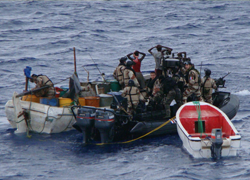While running through my piracy news roundup yesterday morning, I came across this piece by Robert Young Pelton of Somalia Report. In it, Pelton criticizes a report by Australia’s Lowy Institute that deals with the use of privately contracted armed security personnel (PCASP).
I took particular interest in a small tangent within Pelton’s piece that reflects an incorrect sentiment that I have seen repeated many times by non-attorneys (and even by some attorneys): that modern pirates should be considered terrorists.
As Pelton’s Somalia Report piece primarily concerns PCASP, the terrorism issue is only mentioned in a passing parenthetical:
“Pirates are criminals, (never terrorists because that would prevent the payment of ransoms) so it makes sense that a direct response by putting armed guards on ships was the most logical and so far, the most effective response to the pirate attacks.”
From this statement, I gather that Mr. Pelton is of the view that a key reason that the global anti-terrorism network has not been brought to bear against Somali pirates is that such an arrangement would force states to “negotiate with terrorists” once the pirates have seized the vessel and taken hostages. He appears to lament this fact. A similar view has been expressed by former U.S. Ambassador to the United Nations John Bolton and others who argue that relaxed rules concerning due process and state sovereignty as they are applied to terrorists would make the piracy fight a much easier one to win.

(EUNAVFOR)
The oft-expressed desire to equate pirates with terrorists likely stems from several superficial similarities between the two groups. First, as Ambassador Bolton points out, “the same crippling evidentiary and procedural constraints” apply to both terrorists and pirates. Also, both groups consist of non-state actors operating in a truly international fashion to the detriment of the broader international community. Finally, both groups tend to base their operations in the Middle East/North Africa region.
Yet international law is clear as to the respective motives necessary to make one a terrorist or a pirate, and the facts on the ground suggest that, no matter how convenient it may be from a policy standpoint, pirates are not terrorists.
Judge Antonio Cassese, presiding over the Appeals Chamber at Special Tribunal for Lebanon, announced last year that a definition of terrorism has emerged under customary international law. Included in this definition is the requirement that the terrorist has “the intent to spread fear among the population (which would generally entail the creation of public danger) or directly or indirectly coerce a national or international authority to take some action, or to refrain from taking it.”
Conversely, it is well-documented that, although piratical intent is not limited to the desire to rob, for an act to be considered piratical, it must be committed for private ends. This requirement is explicitly laid out in UNCLOS art. 101, as well as its predecessor, 1958 Geneva Convention on the High Seas.
A terrorist’s intent must be to incite mass fear or coerce a government, both purely political motives; a pirate’s motive is strictly limited to making money.
In a smart piece on piracy-law.com couching this definitional issue in terms of a potential defense available to alleged pirates, Roger Phillips rightly notes that, although in theory it is possible to have both political and pecuniary motives, the political motive appears absent in Somali pirates, who choose not to attack well-protected ships or kill hostages simply because it would be less profitable to do so. It seems like a stretch to argue that the pirates’ modus operandi of attacking a privately-owned ship in the middle of the ocean is somehow carried out in order to coerce a government or frighten the public at large by placing them in danger.
Though Roger covered it thoroughly, this definitional point bears repeating because the terrorist theme has gained so much traction in non-legal commentary on the issue of maritime piracy. As tempting as it is to “talk tough” about pirates and the international community’s response to piracy by evoking the specter of terrorism, there is very little merit to the claim that the two terms can, at least presently, be used interchangeably to describe Somali pirates or their West African counterparts.
Respect for the rule of law – apart from being perennial advice given by developed countries to countries like Somalia – requires taking the law as it is written (or trying to change it through legitimate processes) rather than molding it to fit one’s immediate policy preferences. Unless evidence of pirates taking a less profitable course in favor of a strategy with large political payoff emerges – or the definitions of piracy and/or terrorism change – the “pirates as terrorists” slogan will continue to be just that – a slogan.
Jon Bellish is a Project Officer at the Oceans Beyond Piracy project in Boulder, Colorado (though all of his views are his own), and he has experience in United States piracy trials. He just got on Twitter.


